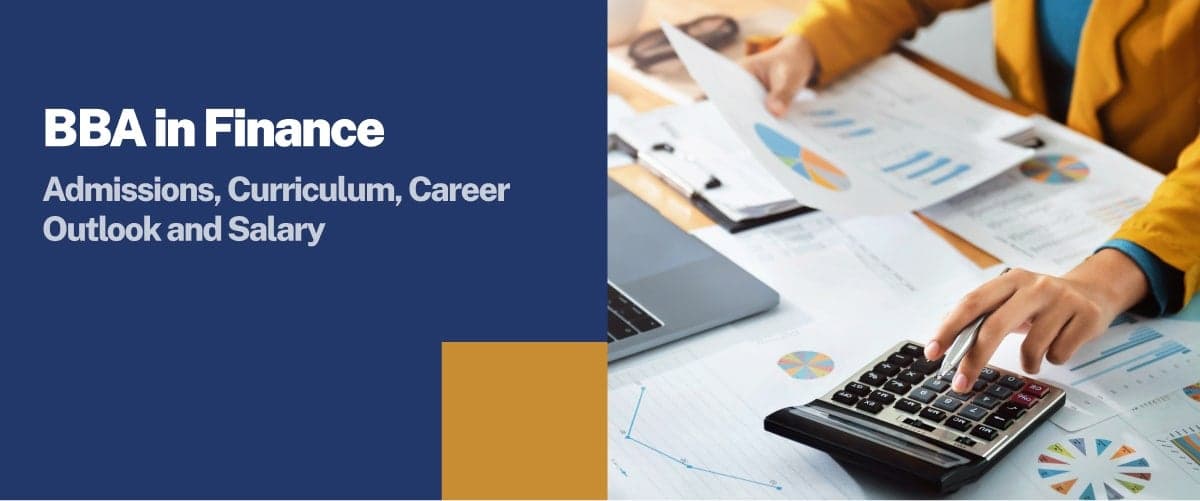5800 students unlocked their dream jobs with UG/PG programs in top colleges. Apply Now!
The BBA in Finance is a three-year undergraduate curriculum focusing on financial management. The program aims to help students gain financial awareness and essential skills for dealing with financial challenges.
After completing your Bachelor of Business Administration in Finance, a world of opportunities opens for you because the finance department is vital in both the business sector and governance. From tax management to government expenditure and debt management, financial management is critical, which is why this subject has gained so much popularity and relevance.
The finance specialisation in BBA is popular among students because it combines practical training with core subjects such as mathematics, economics, banking, and accounting. Knowledge in finance has widespread application in day-to-day operations, so it is very easy to get jobs after BBA Finance. If you are also looking for a BBA course and need some direction, we attempted to present an overview of BBA Finance!
Continue reading to learn more about BBA Finance in detail and depth.
BBA Finance Course Highlights
|
Course Name |
BBA Finance |
|
Degree Level |
Undergraduate |
|
Duration |
Three Years |
|
Total Semesters |
Six Semesters |
|
Eligibility |
Successful passed Class 12 (Some colleges do hold entrance examinations) |
|
Average Course Fees |
₹2 lakhs to ₹5 lakhs |
|
Average Starting Salary |
₹2.5 lakhs to ₹10 lakhs |
BBA in Finance: Eligibility Criteria
The following are the qualifying requirements for BBA Finance:
- The BBA finance degree is designed for students who have completed their senior secondary exams (class 12th).
- A solid academic score is required for admission due to the great competition.
- As the qualifying criterion in their institution, each college determines the minimal percentage necessary for admission.
- Some institutions provide direct admission based on merit, whereas many colleges also have admissions tests.
- Colleges may also undertake personal interviews, group discussions, and other assessment forms as part of the admissions process.
Thus, the qualifying conditions for admission to BBA Finance are particular to the college one chooses.
BBA Finance Course Details: Syllabus
The entire course taught under BBA Finance may differ based on the college. The following is a list of general concepts studied when taking this course:
|
Business Communication |
Statistics for Managers |
|
Basic Accounting |
Research Methods for Businesses |
|
Business Environment |
Micro Economics |
|
Database System |
Production and Operation Management |
|
Corporate Strategy |
Organization Behaviour |
|
Business Statistics |
Operations Management |
|
Business Mathematics |
Management Theory and Practices |
|
Financial Management |
Business Law |
|
Entrepreneurship |
Marketing Management |
|
Human Resource Management |
Information Technology in Management |
|
Macro Economics |
Logistics Management |
|
Strategic Orientation for Businesses |
Ethics, Values, and Corporate Social Responsibility |
|
E-commerce |
Laws Governing Business in India |
|
Marketing for Contemporary Business |
Human Capital Management |
Aside from these topics, students can pick from a variety of electives. The course also involves financial projects, thesis writing, research papers, and internships according to the student's interests.
If you want to learn more, we have a detailed blog on BBA syllabus and subjects.
BBA Finance: Admission
BBA in Finance programmes usually do not need students to take admission tests; nevertheless, certain institutions and colleges have entrance exams. Students may be required to take the same exam in order to be admitted to the BBA in Finance programme. However, such tests are only required if the student is not admitted to the programme based on merit.
Here are some of the most common entrance tests that students can utilise to apply for BBA in Finance programmes in India:
- CUET (Common University Entrance Test)
- DU JAT (Delhi University Joint Admission Test)
- IP MAT (IIM Indore Integrated Program in Management Aptitude Test
- SET (Symbiosis Entrance Test)
- Christ University Entrance Test
- IPM Aptitude Test
- NMIMS NPAT (National Test for Programs after Twelfth)
- SNAP (Symbiosis National Aptitude Test)
- ATMA (AIMS Test for Management Admissions)
- AIMA UGAT (All India Management Under Graduate Aptitude Test)
All of these exams are generally meant for admission to MBA and related programmes; however, many colleges consider the score in these entrance exams for admission to BBA courses.
BBA Finance: Career Outlook
BBA in Finance is one of the most diversified degrees regarding graduates' job opportunities. After completing your degree, you can either choose to work or further your education.
There are several job opportunities available to BBA Finance graduates immediately following graduation, and here is a list:
- Accountant
- Finance Manager
- Budget Manager
- Marketing Manager
- Blockchain Expert
- Data Scientist
- Investment Banker
- Cash Manager
- Risk and Insurance Manager
- Credit Analyst
- Treasurer
- Portfolio Managers
BBA Finance: Job Salary
BBA Finance and Accounts graduates' salaries vary depending on experience and career position. This evaluation considers the candidate's speciality, industry, job profile, technical knowledge, workplace devotion, seniority, and experience.
Employment opportunities for BBA Finance students are accessible in various job roles due to the diversity of the educational system. BBA in Finance graduates may expect to earn between ₹1.5 lakhs per annum and ₹6.2 lakhs per annum.
In the private sector, you can get an average of ₹2 lakhs per annum to ₹4 lakhs per annum after graduating with a BBA in Finance in India.
Conclusion
BBA in Finance is one of India's most sought-after undergraduate management degrees, particularly for individuals interested in doing an MBA in the coming times. So, if you plan to get a BBA Finance degree, you can tap into a world of options and possibilities with Sunstone. It is a higher education service provider that works with educational institutions to help students gain the skills they need to succeed in the workforce. Sunstone is present in more than 50 colleges across the country, and many of them offer BBA degrees.
FAQ - BBA in Finance
What to do after a BBA in finance?
BBA in Finance is a prolific degree that offers ample opportunities for students to start their careers in the financial sector. And since this is an undergraduate degree, BBA in Finance makes you eligible for further education like an MBA.
Is BBA Finance a tough course?
Apparently, a BBA in Finance may seem to be a little more difficult than other graduate degrees, but it is not incomprehensible. Particularly for those who are interested in finance-related studies, BBA in Finance can be a very interesting course.
HELP
Take the first step towards your dream job.
ABOUT THE AUTHOR


